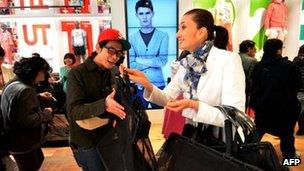Japan retail sales and household spending continues in April
- Published

Japan's retail sales and household spending continued to rise in April, albeit at a slower pace than in earlier months and after the government took steps to boost demand.
Retail sales climbed by 5.8% from a year earlier, while household spending rose by 2.6%.
Policymakers have been trying to boost domestic sales to offset weaker exports.
Car subsidies were cited as one of the main reasons for April's spending.
"The government's subsides are pushing up sales of cars," said Tokyo-based economist Haruka Kazama from Mizuho Research Institute.
At the same time, Mr Kazama added that consumer sentiment was also improving following the earthquake and subsequent tsunami that hit Japan last year.
"Last year people didn't travel much after the earthquake, but this year we see people willing to spend more money on vacations," he said.
Negative issues?
However, there were a number of issues that caused concern.
The retail sales increase seen in April was less than the 6.3% increase that many analysts had forecast. It was also almost half the rate seen in March when retail sales jumped by an annual rate of 10.3%. Household spending was up 3.4% in March.
When compared on a month by month basis, then retail sales were actually 0.3% lower in April than they were in March, the second straight month of declines.
A separate report on Tuesday showed that the rate of unemployment ticked slightly higher in April, hitting 4.6% compared with 4.5% in March.
Analysts warned that a sudden economic shock or longer-term weakness in the jobs markets could offset any economic improvement seen in April.
"We would need to see an increase in salaries for consumption to improve further, but the latest jobless data suggest there is some cause for concern," said Shuji Tonouchi of Mitsubishi UFJ Morgan Stanley Securities.
Japanese stocks had a mixed day, with Tokyo's main Nikkei 225 index falling in early trading before bouncing back to trade about 0.5% higher. The Japanese yen was little changed against the euro and US dollar.
- Published28 March 2012